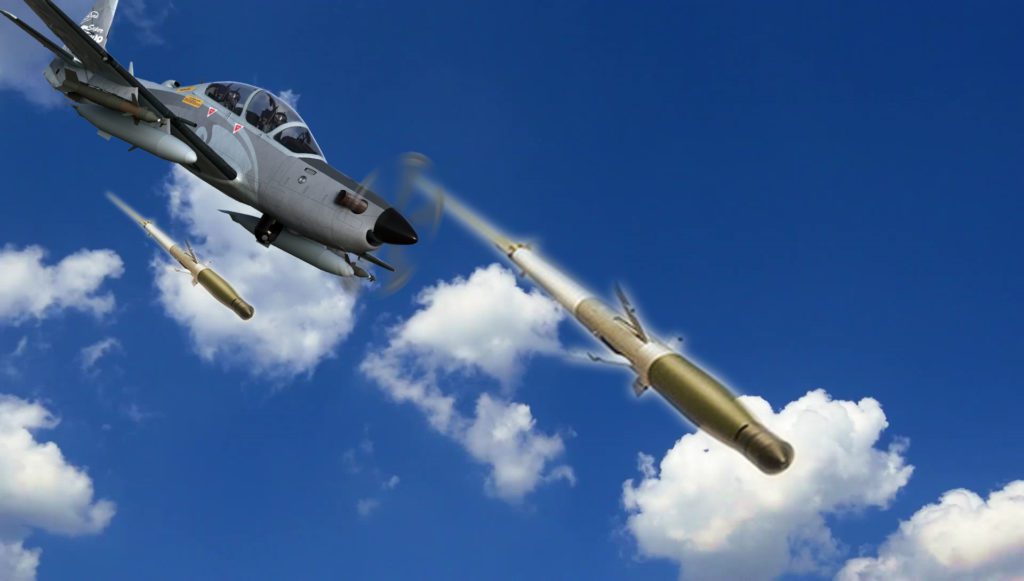For a long time, the Embraer EMB A-29 Super Tucano has been touted as a multi-mission platform capable of performing various types of combat roles with minor modifications.
This aircraft is expected to gain the capability to shoot down drones, cruise missiles, and light aircraft after successful experimental testing of one of its integral weapon systems against a low altitude aerial target.
On 19 December 2019 the United States Air Force successfully intercepted an aerial target using the AGR-20A Advanced Precision Kill Weapon System (APKWS) laser-guided rocket, in its Air Combat Command’s 85 Test and Evaluation Squadron Eglin Air Force Base, Fla.
The test was carried out from an F-16 on the Gulf of Mexico and was conducted to provide proof of concept for using guided rockets paired with a targeting pod to perform aerial defence. During the engagement, a BQM-167 target drone represented a cruise missile, and only a single APKWS rocket was used to bring down the target.
The method could be used to defeat multiple targets representing a more realistic cruise missile attack, said Col. Ryan Messer, commander, 53d Wing. “This proof of concept can have implications for homeland defense missions, Combined Defense of the Arabian Gulf, and beyond.”
The Advanced Precision Kill Weapon System (APKWS) is a combat-proven, semi-active laser-guided 70 mm air-to-surface rocket system designed and manufactured by BAE Systems in collaboration with the US Government. The weapon system is currently deployed by the US military forces.
According to the manufacturer BAE Systems, the APKWS is approximately one-third the cost and one-third the weight of the current inventory of laser-guided weapons, has a lower yield more suitable for avoiding collateral damage. The munition takes only one-quarter of the time for it to be loaded and unloaded by weapons personnel.
Originally developed as a low cost, low collateral damage air-to-ground weapon for use in Afghanistan and Iraq, adapting the AGR-20A for counter-air use is momentous. At a cost of $30,000, the AGR-20A is about four percent of the cost of an AIM-120 missile commonly used for cruise missile defense. Due to its limited range, the AGR-20A can be used only at short range and in good weather conditions. However, using Millimeter-Wave seekers could enhance its operability at inclement weather conditions. APKWS-II was developed and is produced by BAE Systems.
In 2016 the APKWS was integrated with a wide range of tactical aircraft including the F-16 and A-10 and US Marine Corps F/A-18D, Airbus AC-235 (the Jordanian gunship) and Embraer Super Tucano (for Lebanon and Nigeria). The weapon has also been exported to or ordered by a number of Middle Eastern countries including Jordan, Lebanon, Qatar, UAE, and Saudi-Arabia, as well as Nigeria.
In February, the Nigerian Air Force placed an order with Embraer Defense & Security and its partner Sierra Nevada Corporation (SNC) to procure 12 A-29 Super Tucano light attack aircraft. Under the contract, Embraer and SNC will provide ground training devices, mission planning systems, mission debriefs systems, spares, ground support equipment, and alternate mission equipment.
As part of an order for 12 Super Tucano Counter-Insurgence (COIN) aircraft, the Nigerian Air Force (NAF) will also receive the Advanced Precision Kill Weapon System (APKWS).
The United States Department of Defense (DoD) confirmed on 6 February, that a USD225 million contract for the Advanced Precision Kill Weapon System (APKWS), was awarded to BAE Systems for all four branches of the US military, as well as the governments of the Netherlands and Nigeria.
The Advanced Precision Kill Weapon System (APKWS) as well as the GBU-58 Paveway II guided bombs are both options for the 12 Embraer EMB 314/A-29 Super Tucano light strike aircraft which was requested by Nigeria.
Even though the APKWS rocket system was never intended as a front line air defence weapon, it could temporarily fill the gap in Nigeria’s air defence requirement until a more potent platform is acquired.
For now, Nigeria has limited air defence capability, provided by the PL-9C anti-aircraft missile, sixteen Roland mobile air defence system, some Soviet-era Shilka multi-barreled air defence guns as well as various MANPADS.
